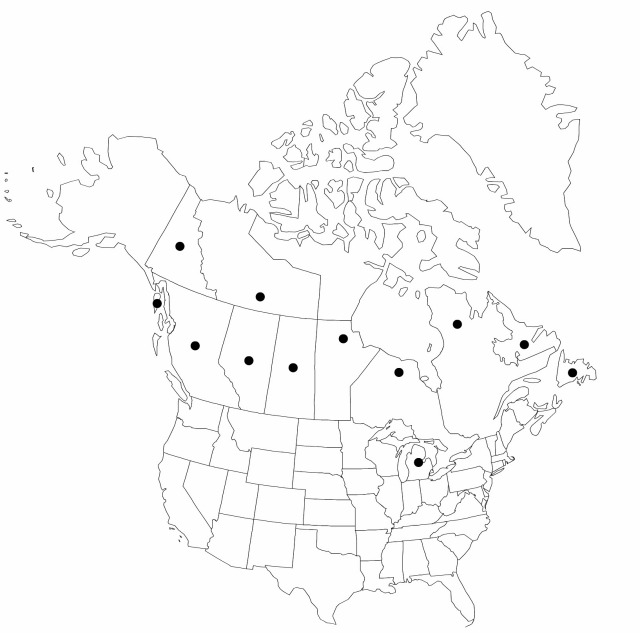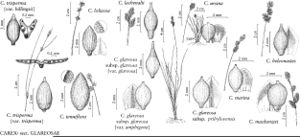Difference between revisions of "Carex heleonastes"
Suppl. Pl., 414. 1782.
FNA>Volume Importer |
FNA>Volume Importer |
(No difference)
| |
Revision as of 21:09, 16 December 2019
Plants loosely cespitose, in small clumps; rhizomes short. Culms erect, slender, 15–35 cm, rough distally. Leaves: sheaths pale brown abaxially, inner band hyaline, often red tinged, concave at summit; ligules wider than long; blades pale green or slightly gray-green, flat or slightly involute, 5–15 cm × 1–2 mm, shorter than culms. Inflorescences 0.8–2 cm × 5–10 mm; proximal bracts scalelike, occasionally bristlelike, shorter than spikes. Spikes 3–4(–6), lateral spikes gynecandrous, closely approximate or proximal spikes slightly separate, individually distinct, containing 5–10 perigynia, ovoid-globose, 4–7 × 5–10 mm; terminal spike not clavate. Pistillate scales red-brown with lighter center and broad white-hyaline margins, oblong-ovate, subequal to perigynia, apex obtuse. Perigynia appressed-ascending, green-white proximally and pale brown distally, often mid brown in mature perigynia, finely several-veined, elliptic-obovate, 2.5–3.5 × 1.2–1.5 mm, widest near middle, subcoriaceous; beak short, entire or with few marginal teeth. Achenes red-brown, broadly obovate, 1.5(–2) × 1–1.2 mm, dull to slightly glossy. 2n = 56.
Phenology: Fruiting Jun–Aug.
Habitat: Mires, damp meadows, lowlands
Elevation: 0–1500 m
Distribution

Alta., B.C., Man., Nfld. and Labr., N.W.T., Ont., Que., Sask., Yukon, Alaska, Mich., Eurasia.
Discussion
The rather doubtful species Carex neurochlaena T. Holm, described from Rink Rapids in Yukon, was recognized as C. heleonastes subsp. neurochlaena. It is characterized by slightly smaller perigynia with a short, smooth beak and distinct veins; scales with distinct, in some cases, rather broad hyaline margins; and spikelets brownish. Very little material of C. heleonastes, in the broad sense, is available from northern Yukon and Alaska, and the distinction and distribution between C. heleonastes and C. neurochlaena remains obscure. Most specimens collected from Alaska and identified as C. neurochlaena belong to C. marina.
Selected References
None.
